|
|
|
Klaus Barbie was sent to the French city of Lyon, the "Capital of the French Resistance," in November 1942 with two assignments: to take down the French Resistance and to get rid of the Jews in the city. There were many French collaborators who were eager to assist him. In the first scene of Inglourious Basterds, the dairy farmer brings out a quart-sized glass milk bottle with a paper cap when Col. Landa turns down a glass of wine and asks for a glass of milk instead. But wait a minute! Did the dairy farmer bottle his own milk, rather than having it picked up from the farm in large milk cans and taken to a processing plant? Or did he drive a wagon into the nearest town and buy milk in glass bottles from a store? The movie gets more ridiculous by the minute as Col. Landa pulls out a fountain pen and proceeds to fill it with ink from a small bottle that he carries with him. What did people really do, back in the old days, when their fountain pen ran of of ink? I don't know, but I don't think anyone carried a bottle of ink in their pocket. Finally, Col. Landa lights up a pipe, which is a calabash pipe like the one that Sherlock Holmes smoked. That's when I finally burst out laughing as I realized that this movie really is a comedy and it is not to be taken seriously. 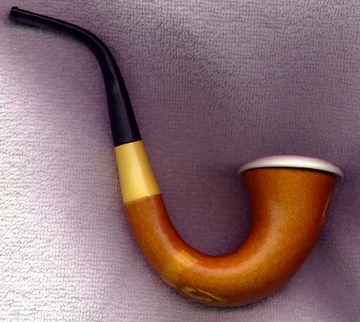 Every school child in the world knows that Anne Frank and her family hid from the Nazis in the Netherlands, but were found by an SS officer, who coincidentally was from Austria, just like Col. Hans Landa in the movie. Anne and her family were not shot like the Dreyfus family in the movie, but were instead sent to the Westerbork transit camp and then to Auschwitz. Why did the Nazis have camps, if they were just going to shoot the Jews as soon as they were captured? O.K. I know that the movie is a fairy tale and the fact that it doesn't make sense is supposed to be part of the comedy. In the movie, only one member of the Dreyfus family escapes: the 18 or 19 year old Shoshana, played by Melanie Laurent. As she runs away, Col. Landa takes aim at her with his pistol, as shown in the photo of him above, but then decides not to shoot her. Instead, he calls out "Goodbye, Shoshana." He knows that he will see her again in Chapter 3 which is entitled "German night in Paris." But first the audience must endure Chapter 2, entitled "Inglourious Basterds," which introduces the second story line. Inglourious Basterds is deliberately misspelled in the movie title to distinguish this movie from an Italian movie of the same name that was released in 1978. The misspelled name is carved into the rifle butt of one of the Basterds. Tarantino's film is not a remake of the previous one with the same title. Each of the 5 chapters in the film is supposed to pay tribute to a specific movie genre. Chapter 2 is a tribute to movies like "The Dirty Dozen," which has a plot similar to this chapter. Tarantino's films are a genre of their own. When Chapter 2 starts, we are not told what year it is. Are we to assume that it is still 1941 during the time when Chapter 1 took place? It can't be 1941 because America was not openly involved in the war against Germany until December 1941 and the OSS was not formed until June 1942. In one of the trailers, the narrator says that the Basterds are in "the secret service." However, near the end of the film, we learn that the Inglourious Basterds are in the OSS. In real life, America did drop members of the OSS into occupied France, dressed in civilian clothes, for the purpose of helping the French Resistance, which was fighting as illegal combatants, after France signed an Armistice and promised to stop fighting. However, these American OSS guerrilla fighters were selected because they spoke fluent French; they were trained in Canada where they learned how a Frenchman would act, so they would not get caught. Not much is known about the real OSS men except for Rene Guirard, who was captured and sent to the Dachau concentration camp, where he was one of the survivors. Guirard was not treated as a POW because he was fighting as an illegal combatant. There was a group of Jewish American soldiers known as The Ritchie Boys who were sent to Europe, but not as terrorists. Their purpose was to interrogate captured Germans and gather evidence of war crimes, not to commit war crimes themselves. There was a real life unit of soldiers, called the Jewish Brigade, that fought in World War II. More than 5,000 Jews, including some from Palestine, volunteered for the Jewish Brigade Group of the British Army, which began fighting in September 1944. After the war, members of the Jewish Brigade went on a revenge killing spree, hunting down former German soldiers in order to torture and execute them. However, as far as I know, the Jewish Brigade didn't scalp any German POWs during or after the war. Brad Pitt plays the part of a character named Aldo Raine whose nickname is "Aldo the Apache." The name Aldo comes from the name of movie actor Aldo Ray who starred in the 1955 war movie, "Battle Cry." The name Raine is from Major Charles Rain, one of the characters in the Vietnam vet revenge movie "Rolling Thunder." At the start of Chapter 2, the Aldo Raine character gives a speech to his men in which he says that he is from the Smokey Mountains, which are in Tennessee, the home state of Quentin Tarantino. The fictional Aldo Raine says that he is descended from the real life Jim Bridger, who was a famous mountain man. Jim Bridger married an Indian woman, so the fictional Aldo Raine has some "Injun blood." Aldo tells his men that they are going to fight like the Apache resistance fighters. The real life Apaches fought for 20 years to keep their land from being taken by the settlers in the West. Although greatly outnumbered, the Apaches fought by using terror tactics which put fear into the hearts of the soldiers in the US Cavalry. There were no real life Apaches in the OSS who scalped German POWs in World War II, but there was a Cherokee Indian named Lt. Jack Bushyhead who massacred German Waffen-SS soldiers after they surrendered at Dachau; he justified his actions by saying that he was avenging the deaths of his ancestors on the Trail of Tears when the Cherokees were forced to vacate their land and march westward. American soldiers who liberated Dachau did cut off a few fingers to steal the SS rings from the hands of the Waffen-SS soldiers killed in the massacre, but no scalps were taken, as far as I know. Aldo Raine explains to his men the purpose of the atrocities that he wants them to commit: to terrorize the German army with the "disemboweled, dismembered and disfigured bodies we leave behind us." "The Germans will fear us." and "The Germans will be tortured by the evil they have done." What evil? The soldiers who are being killed and mutilated by the Basterds were in the regular German Army, called the Wehrmacht, the most disciplined army in the world. This scene is taking place in 1941, or 1944 at the very latest, and the concentration camps have not yet been liberated. The gas chambers have not yet been found. Nothing was known about the gas chambers until the British BBC started broadcasting stories about them in June 1942. In any case, the Wehrmacht was fighting on the battlefield, not killing Jews in gas chambers, and few of them were members of the National Socialist political party. Most of the Wehrmacht soldiers had enlisted, or been drafted, into the army before the age of 21 when they would have become eligible to join the Nazi party. Aldo the Apache pronounces the word Nazis like Gnat-zies, as he explains the reason that all German soldiers must be killed: "Nazis ain't got no humanity. They're the foot soldiers of a Jew-hatin', mass murderin' maniac and they need to be dee-stroyed. That's why every son of a bitch we find wearin' a Nazi uniform, they're gonna die." The word Nazi seems to be used in the film to mean any German who was not a traitor to his country in World War II. The word actually refers to a member of the National Socialist political party which was given the nickname Nazi by German Jews who came to America after the National Socialists came to power in 1933. Nazi is correctly pronounced like the first two syllables of the word Nazionale in the term Nazionale Socialiste. The Inglourious Basterds deliberately commit the worst kind of war crimes and totally enjoy it. This part of the movie reflects badly on America and on the Jewish soldiers in the American Army as well as on today's IDF soldiers in Israel because nothing like this ever happened in real life. On the other hand, the German Wehrmacht soldiers acquit themselves well in this movie. In the most intense scene in the movie, a blond, blue-eyed German Wehrmacht soldier keeps his composure in the face of what he knows is going to happen. He has just been ordered to put his "Wienerschnitzel-licking finger" on a map to point out the location of the rest of his unit, but he "respectfully refuses" to betray his fellow soldiers. He knows that Sgt. Donny Donowitz, known as "the Bear Jew," is now going to beat him to death with a baseball bat, but he does not beg for his life. Instead he says to Aldo the Apache in English, "Fuck you and your Jew dogs." The first time I saw the movie, I did not see anything funny in Chapter 2. The second time I saw it, Sgt. Donny Donowitz, the Bear Jew, struck me as funny. In the movie, Aldo says, "Watchin' Donny beat Nazis to death is the closest we ever get to goin' to the movies." 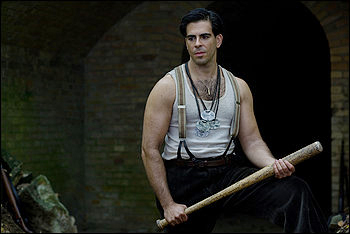 The Bear Jew takes a long time to enter the scene as the audience waits expectantly. When he finally arrives, he looks like an Olympic athlete entering a stadium with a cluster of medals hanging around his neck, as shown in the photo above. He is wearing the medals ripped from the uniforms of the soldiers that he has beaten to death. His first act is to hit the Iron Cross medal on the German soldier's uniform with his bat, as he asks, "Did you get that for killing Jews?"  The Bear Jew then kills the brave German soldier with one blow of his bat, but continues to hit him again and again as he yells at the top of his lungs about Fenway Park, the baseball stadium in Boston, and the famous Boston Red Sox baseball player Ted Williams who is Jewish. Eli Roth, the actor from Boston who plays the part of the Bear Jew, said this in an interview: "For a Jewish guy from Boston who grew up with fantasies of killing Nazis, it was the most orgasmic, satisfying experience. My grandparents came from Kiev, they came from Austria, and they came from Poland. And they got out, but their relatives did not. So I grew up with this knowledge that if I had been born in Europe, we would have been sent to the camps. And I could not understand why they didn't fight back. I had read Night by Elie Wiesel when I was 9 or 10, and I grew up with real fantasies by that age of killing Nazis. I'm tired of seeing Jews portrayed as wimps in films." The problem is that the German Wehrmacht soldiers were fighting honorably for their country and they had nothing to do with killing the Jews in the Holocaust. The purpose of sending the Inglourious Basterds to France was not to get revenge for the Holocaust, but rather to induce the Germans to stop fighting. This inconsistency turns out to be funny as the viewer realizes that the whole scene is ridiculous. Keep in mind that this movie is about making fun of various film genres. One of the victims of the Inglourious Basterds is a German soldier named Private Butz, played by German actor, Sönke Möhring. Of all the German names that Tarantino could have picked for this minor character, why did he choose the name Butz? Anyone familiar with the Holocaust knows of a famous American named Butz. At least Americans will now learn how to pronounce the name; it is not pronounced Butt-z. After the first soldier is killed by the Bear Jew, Private Butz quickly points to a spot on the map without even looking at it. He is allowed to live, but the Basterds carve a swastika on his forehead so that he will always be identified as a Nazi even when he takes off his uniform. Later, when Private Butz tells Hitler about how the Basterds kill German soldiers and then scalp them, Hitler threatens to hang the Basterds from the Eiffel Tower in Paris. Then Private Butz shows Hitler the swastika on his forehead. If this were real life, Hitler would have had a screaming fit about the position of the swastika which was not the way he himself had designed it for the Nazi flag. The photos below show how the Basterds got the whole thing wrong. 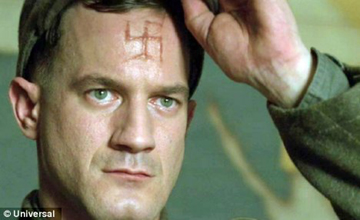 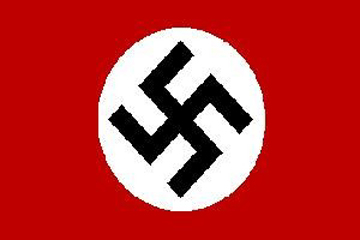 One of the Inglourious Basterds is a former German soldier who is a Jew from Austria, named Sgt. Hugo Stiglitz, which was also the name of a Mexican movie star in the 1970s. (Yes, there were German soldiers, born of Jewish fathers, in the German Army; the most famous was Luftwaffe Field Marshal Erhard Milch.) When Stiglitz is introduced, the movie plot takes time out to present his "back story," which is the account of how he came to be a member of the Inglorious Basterds. Stiglitz was an enlisted man in the Germany Army who turned traitor and killed 13 Gestapo officers; he was imprisoned in Berlin for his crimes. The Basterds freed him from prison because Aldo Raine wanted to recruit him to join them. Aldo tells him, "I'm a big fan of your work." The part of Stiglitz is played by Til Schweiger, a German actor, whose acting performance stands out in the film. The photo below shows him as the mean-looking Basterd, Sgt. Hugo Stiglitz. 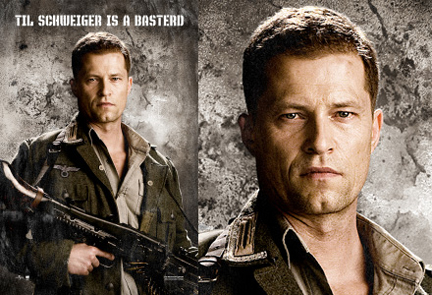 Audience members who survive Chapter 2 are rewarded with one of the best scenes in the movie in Chapter 3 which is entitled "German Night in Paris." Melanie Laurent gives such a good performance that she could be nominated for best supporting actress. Chapter 3 opens with Shoshana, played by Melanie Laurent, up on a ladder putting letters onto a theater marquee; she owns a theater which she inherited from her aunt. A German soldier named Frederick Zoller notices her and tries to engage her in a conversation, but she doesn't want anything to do with him. Zoller is oblivious to the fact that she is not interested in him. In those days, her behavior would have been called "playing hard to get." Tarantino is famous for putting obscure references to old films into his movies. For example, I spotted the names Leni Riefenstahl, Max Linder and G.W. Pabst on the theater marquee. The second time I saw the movie, I noticed the title of the 1940s French film "Le Corbeau" on the marquee. A German film produced by Goebbels, entitled "Lucky Kids" is mentioned in the movie, as is Lillian Harvey, a 1940s movie star. In another scene where Shoshana is putting new movie titles on the marquee, she is whisked away to a French restaurant by a German officer who tells her to get her ass into his car. She soon learns that she has been brought to the restaurant at the request of her admirer, Frederick Zoller, who is starring in a propaganda movie produced by Propaganda Minister Josef Goebbels. Zoller is a German war hero, comparable to the American World War I hero Sgt. York, according to the film. Zoller is attracted to Shoshana and he attempts to impress her by moving the premiere of Goebbel's movie about him, "Nation's Pride," to her theater in Paris, instead of its scheduled opening at the Ritz. 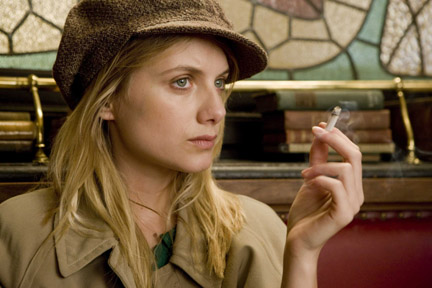 Col. Hans Landa shows up at the restaurant, where Shoshana has been brought to meet Zoller, because he is handling security for Goebbel's movie premiere and he wants to talk with the owner of the theater. Col. Landa kisses Shoshana's hand and invites her to join him for dessert after Zoller leaves. Everyone in the audience is holding their breath waiting for Col. Landa to reveal that he knows that he is talking to Shoshana, although she has changed her name and dyed her hair blonde. Col. Landa asks Shoshana a lot of questions, and then he says, "I have something else that I want to ask you." After a slight pause, he says "But I can't remember what it was." After Col. Landa tells her about the premiere, Shoshana realizes that the top four Nazi leaders will be in her theater at the same time and she immediately hatches a plan to end World War II. Unknown to her, the Basterds and the British are working on their own plan to end the war by killing all the top German leaders. The projectionist at Shoshana's theater, who is also her lover, is a black man named Marcel, played by Jackie Ido. Col. Landa shows the prejudice of Hitler and the Nazis when he tells Shoshana that he does not want to entrust a black man with the job of being the projectionist at the premiere of the movie. France had colonies in Africa and there were many Africans in France at that time. Col. Landa orders Apfel Strudel for himself and for Shoshana without asking her what she wants. He then orders espresso for himself, but a glass of milk for her. Is he trying to tell her that he knows that she is the Jewish girl who escaped from the dairy farm? Or is he just looking out for her health? The audience doesn't know and neither does Shoshana. Melanie Laurent gives one of the best performances in the movie as her character and the character played by Christoph Waltz interact in a cat and mouse game. The waiter brings the desserts and Col. Landa says that he forgot to order whipped cream for the Strudel. Col. Landa is from Austria - there is no way that he forgot the whipped cream. This is a French restaurant so the waiter didn't ask if they wanted whipped cream when taking their order, as any German waiter would have. Is Col. Landa trying to torture Shoshana by making a big fuss over whipped cream, another dairy product? The waiter brings the whipped cream and we see an extreme close up of the cream as he spoons some onto each plate. Curiously, Col. Landa eats with his fork in his right hand and cuts his Strudel with his fork, the way an American would. Germans and Austrians eat with their fork in the left hand and their knife in the right hand, never cutting anything with a fork. What is Col. Landa trying to tell us? That he likes all things American and he might even be willing to defect to the American side if given the opportunity? In the restaurant scene, Col. Landa takes big bites of his Strudel and talks with his mouth full. Then he puts out a cigarette in his unfinished Strudel. Only an American would do something that gross. Keep in mind that Col. Landa is from Austria and the Austrians are famous for their impeccable table manners. He is definitely trying to tell us something. It is evident that a lot of research has gone into this film. For example, none of the German characters use the term "Third Reich." Col. Hans Landa makes a toast to the thousand year Reich, which was Hitler's term for his regime. Col. Landa also uses the term "National Socialists." The members of the National Socialists political party in Germany didn't call themselves Nazis. If Nazi were a German word, the plural would be Nazim. Sylvester Groth, the actor who plays Josef Goebbels does a good job of portraying him in the movie. Goebbels is introduced in the movie with words on the screen which say that he is the Number 2 man in the Third Reich. Maybe Goebbels is the second most well-known man in Germany, next to Hitler, but many people would argue that Herman Goering, or even Martin Bormann, is the Number 2 man in the Third Reich. Reichsführer-SS Heinrich Himmler, who was the head of the SS and the real No. 2 man in the Third Reich, is not mentioned in the movie as this would have spoiled the ending since Himmler could have taken over as the ruler of Germany in the event of the deaths of Hitler, Goebbels, Goering and Bormann. Chapter 4 is entitled "Operation Kino." Kino is the German word for movie. Operation Kino is a British plot to kill Hitler and his henchmen at a movie premiere. Michael Fassbender plays a British soldier named Lt. Archie Hicox, who is given an assignment by fictional British General Ed Fenech, played by Mike Meyers. Hicox is a film critic who has written two books about film history and in one of the books, he wrote about G.W. Pabst, a real life German film director. Churchill makes a brief appearance but is not identified because Rod Taylor, the actor who plays Churchill, has such a remarkable resemblance to him that it is not necessary. Rod Taylor used to be a leading man in Hollywood movies. Who knew that he would age into a likeness of Churchill? 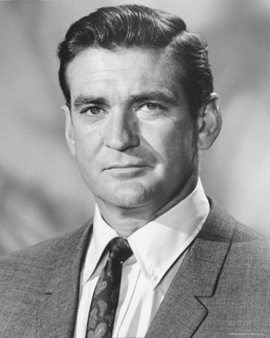 At some point in this chapter, one of the British characters says something about the Germans calling themselves "the Master Race." Master race is the American translation of Hitler's term Herrenfolk. The British translation is "Race of Lords." Lords, as in the House of Lords, which is the British equivalent of the German word Herren which means aristocratic when used as an adjective. Lt. Archie Hicox is parachuted into Paris, from where he proceeds to the small French village of Nadine where he will meet up with Bridget von Hammersmark, a German movie actress, who is a double agent. She is pretending to be a German spy, but she is really a British spy. It was von Hammersmark who dreamed up a plot for the British to kill the German leaders at the premiere of Goebbel's movie "Nation's Pride" about German war hero Frederick Zoller, which is to be held in the Paris theater owned by Shoshana, the Jewish girl who escaped from Col. Hans Landa in the first Chapter. Chapter 4 features a long drawn out scene in a bar in a cellar where Lt. Archie Hicox is dressed as a German SS officer, sitting at a table with Bridget von Hammersmark. The Basterds have also come to Nadine, dressed in German SS uniforms. Sgt. Stiglitz is flashing his knife with an engraved blade. With everyone dressed in SS uniforms, some in the black dress uniform and some in gray field uniforms, it is hard to keep all the characters straight. There is also a Wehrmacht soldier, named Cpl. Wilhelm Wicki, played by Gedeon Burkhard, who claims to be having a night out to celebrate the birth of his son Maximilian, but what is he really doing there? 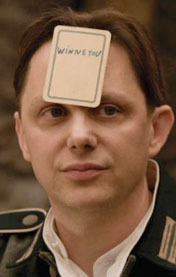 The British impostors and the real SS men are playing a guessing game in which the player has a card with the name of a person or animal, real or fictional, stuck onto his forehead. The player must guess the name by asking questions of the other players who can see the name on the card. The first name that was used in the game is "Winnetou," an Apache Indian character in a Karl May book. Karl May was a popular German author, who had never been to America, but he wrote fictional books about the American West. As a young boy, Hitler read many of Karl May's books. The scene ends in a Mexican standoff, which is a Tarantino speciality. There is a shootout which leaves Lt. Hicox, Sgt. Stiglitz and the SS men dead. Only Cpl. Wilhelm Wicki, the Wehrmacht soldier, and Bridget Von Hammersmark are still alive. She grabs a gun on the floor and shoots Wilhelm dead, after calling him "a fucking traitor." Brad Pitt, as Aldo the Apache, comes into the cellar and rescues von Hammersmark who has been shot in the leg. Col. Landa shows up after everyone is gone and finds a shoe left behind by von Hammersmark. He knows that the shoe belongs to von Hammersmark because he also finds a napkin with her name on it. Chapter 5 is called "The Revenge of the Giant Face." The title refers to a close up of the face of Shoshana on the screen in the grand finale. This is the last chapter and it opens with Shoshana putting on her makeup in preparation for the premiere of Nation's Pride. The sound is turned up as we hear David Bowie's "Cat People" (Putting Out The Fire). Three of the Basterds (Aldo Raine, Bear Jew and Little Man) have come to the premiere as the guests of von Hammersmark whose leg was patched up by Aldo Raine and put into a cast. Col. Landa greets von Hammersmark and inquires about the cast on her leg. This is one of the best scenes in the movie as Col. Landa cracks up laughing at her explanation that she broke her leg in a mountain climbing accident. Leni Riefenstahl, who made propaganda movies for Hitler, including the famous "Triumph of the Will," was a real mountain climber, so a woman mountain climber was not unknown back then. The problem is that Col. Landa knows that von Hammersmark was in the bar the night before and couldn't have been on a mountain climbing trip. At the premiere, the three Basterds are disguised as Italians, although they know only one or two words of Italian. Eli Roth's character, the Bear Jew, is pretending to be an Italian movie director named Antonio Margheriti, which is the real life name of an Italian director from the 1970s and 1980s who made such films as "Cannibal Apocalypse" and "Yor, the Hunter from the Future." Col. Landa, who is fluent in English, German and French, speaks to them in what sounds like fake Italian, never letting on that he knows who they are and that he is onto their plot. Col. Landa knows all about the Basterds because he has talked with their victims who returned home with swastikas on their foreheads. All of the reviews of the movie that I read used words like monster, sociopath, psychotic, slimy, sadistic and evil to describe the Col. Hans Landa character. I didn't get that impression at all. Col. Landa is a perfect example of the German SD and Gestapo men who were so good at getting information without resorting to torture that, after the war, some of them were recruited by the Allies to help them in their intelligence agencies during the Cold War. For example, Horst Kapkow, who was recruited by the British, and Reinhard von Galen, who was recruited by America. Samuel L. Jackson narrates a segment about how nitrate film is highly flammable. Shoshana has a collection of 350 old movies on nitrate film, and she is planning to set the theater on fire, killing the leaders of the Third Reich. The whole idea behind the movie Inglourious Basterds is that cinema saves the world by ending World War II. Shoshana shoots some new film footage and splices it into the fourth reel of the movie Nation's Pride. As Hitler and his henchmen are watching the movie, all of a sudden they see flames engulf the theater. The face of Shoshana is shown in close up on the screen, as she says, "I have a message for Germany. You are all going to die. Look into the face of the Jew who is going to do it." As the theater is burning, the Bear Jew machine guns Hitler to death, almost obliterating his face with bullets. The last thing that Hitler sees before he dies is the face of a vengeful Jew. There is a surprise ending which I won't reveal except to quote Aldo the Apache, who says at the very end, "I think this just might be my masterpiece." HomeThis page was last updated on August 31, 2009
|